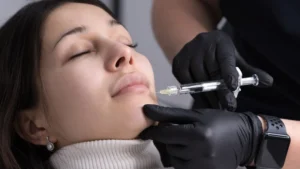Tonsil stones, those small, often bothersome formations in the pockets of your tonsils, have gained attention. But now, with the increasing popularity of vaping, questions arise about its connection to these uncomfortable stones. Vaping, a trend involving inhaling vapor from electronic devices, has raised concerns regarding its effects on our health. People wonder: does vaping cause tonsil stones?
This query matters because both tonsil stones and vaping impact daily life. Understanding whether vaping contributes to these formations can aid in making informed choices about our habits and well-being. Let’s explore this intriguing link between vaping and tonsil stones to unravel potential insights.
What Are Tonsil Stones?
Tonsil stones, medically referred to as tonsilloliths, are small, hard accumulations that can form within the crevices of your tonsils.
These structures are made up of various particles like dead cells, food particles, and debris, which may get trapped in the tiny pockets and folds of your tonsils.
Over time, these particles can combine and solidify into the characteristic hard masses known as tonsil stones.
Formation in the Tonsil Crevices
Your tonsils, which are soft tissues located at the back of your throat, contain numerous nooks and crannies.
These nooks, also called crypts, can trap particles that enter your mouth, such as food remnants, bacteria, and mucus.
Read Also: Does Vaping Make Your Teeth Yellow?
When these particles get lodged in these crypts, they provide a foundation for tonsil stones to develop.

Size and Symptoms
Tonsil stones can vary in size from tiny grains to larger, more noticeable formations. They often appear as white or yellowish bumps on the surface of the tonsils.
Some people might not experience any symptoms, while others may notice discomfort, a persistent bad breath odor, or a feeling of something being stuck in their throat.
Natural Excretion and Dislodging
In some cases, tonsil stones can naturally dislodge on their own through swallowing and movement of the tongue.
However, larger or more firmly attached tonsil stones might require intervention or removal by a medical professional.
Does Vaping Cause Tonsil Stones?
Vaping, the act of inhaling vapor from electronic devices, has prompted discussions about its potential link to the formation of tonsil stones.
While research is ongoing, there are factors that suggest a possible connection worth exploring.
Impact on Saliva Production
Vaping can lead to reduced saliva production. Saliva helps cleanse the mouth, washing away particles and maintaining oral health.
Insufficient saliva could potentially contribute to the accumulation of debris in the tonsil crevices, a key factor in tonsil stone development.
Read Also; Does Vaping Make You Lose Weight?
Altered Oral Microbiome
The oral microbiome, the collection of bacteria in the mouth, plays a crucial role in oral health. Some studies indicate that vaping may alter the balance of bacteria in the mouth.
An imbalanced microbiome could create an environment conducive to the growth of bacteria that contribute to tonsil stone formation.
Heat and Irritation
The heat and chemicals produced during vaping might irritate the delicate tissues of the throat and tonsils.
This irritation could lead to inflammation and enlargement of the tonsil crypts, potentially providing more space for particles to become trapped and form tonsil stones.
Nicotine’s Potential Role
Nicotine, commonly present in vaping products, could also play a role. Nicotine might affect blood flow to the tonsils and their surrounding tissues, potentially influencing the conditions for tonsil stone formation.
The Science Behind Tonsil Stones and Vaping
Understanding the potential link between vaping and tonsil stones involves exploring the scientific mechanisms that could contribute to their formation.
Impact on Salivary Glands and Secretion
Vaping has been associated with reduced saliva production. Saliva acts as a natural cleanser in the mouth, helping to wash away debris and bacteria.
Reduced saliva flow due to vaping could allow particles to accumulate in the tonsil crevices, providing a foundation for tonsil stones to develop.

Altered Oral Microenvironment
Vaping may disrupt the balance of bacteria in the mouth, which is known as the oral microbiome.
This disruption could create an environment where certain bacteria thrive, potentially contributing to the formation of tonsil stones.
Bacterial imbalances can encourage the accumulation of materials that form these small, hard masses.
Chemical Irritation and Tissue Changes
The chemicals and heat produced during vaping might cause irritation to the delicate tissues of the throat and tonsils.
This irritation could lead to inflammation and changes in the structure of the tonsil crypts, making them more prone to trapping particles and forming tonsil stones.
Read More: Can Vaping Cause Kidney Stones?
Nicotine’s Role in Blood Flow
Nicotine, present in many vaping products, can constrict blood vessels. This constriction could affect blood flow to the tonsils and surrounding tissues.
Altered blood flow might impact the overall health of the tonsils and contribute to conditions conducive to tonsil stone development.
Tips for Prevention
Maintaining good oral hygiene and making certain lifestyle adjustments can help reduce the risk of tonsil stone formation, whether or not you’re a vaper.
Brushing and Gargling Techniques
1. Regular Brushing: Brush your teeth and tongue thoroughly at least twice a day to minimize bacterial buildup in the mouth.
2. Gargling: After brushing, consider gargling with a mild, non-alcoholic mouthwash. This can help dislodge debris and promote oral cleanliness.
Stay Hydrated
3. Drink Water: Staying hydrated supports saliva production, which aids in naturally cleaning the mouth and preventing the accumulation of particles.
Watch Your Diet
4. Balanced Diet: Consume a balanced diet rich in fruits and vegetables. Chewing fibrous foods can stimulate the salivary glands and help cleanse the mouth.
5. Limit Sugary and Processed Foods: Sugary and processed foods can contribute to bacterial growth. Minimizing their intake can help maintain a healthier oral environment.
Dental Care
6. Regular Dental Check-ups: Schedule regular dental visits for professional cleanings and to address any oral health concerns promptly.
7. Discuss Vaping with Your Dentist: If you vape, have an open conversation with your dentist about it. They can offer tailored advice and monitor your oral health closely.
Conclusion
In the quest to understand whether vaping causes tonsil stones, it’s clear that several factors interplay.
While direct causation is not yet fully established, the potential mechanisms behind this connection shed light on how vaping might influence tonsil stone formation.
Reduced saliva production, changes in the oral microbiome, irritation from vaping, and nicotine’s effects on blood flow collectively contribute to this complex relationship.
Maintaining good oral hygiene practices, staying hydrated, and making wise dietary choices are fundamental steps for preventing tonsil stone formation.
Regular dental check-ups and open communication with your dentist, especially if you vape, can ensure proactive oral care.
Remember, the world of medical research is ongoing and complex. Staying informed, discussing concerns with healthcare professionals, and making informed choices remain crucial for your overall health.
FAQs about Vaping and Tonsil Stones
1. Can vaping directly cause tonsil stones?
While a direct link is not definitively established, vaping’s impact on saliva production and the oral microbiome might contribute to their formation.
2. Is nicotine responsible for tonsil stone development?
Nicotine’s effects on blood flow and its potential influence on oral health could contribute, though further research is needed.
3. Can vaping worsen bad breath?
Yes, vaping might impact oral health, potentially leading to bad breath due to changes in the mouth’s environment.
4. Are people who don’t vape at risk of tonsil stones?
Yes, anyone can develop tonsil stones due to factors like debris accumulation in the tonsil crypts, irrespective of vaping habits.
5. How can I prevent tonsil stones if I vape?
Practicing good oral hygiene, staying hydrated, and discussing vaping with your dentist are key steps to reduce the risk.
6. Can vaping cause other oral health issues?
Yes, vaping can potentially lead to dry mouth, irritation, gum problems, and changes in oral bacteria.
7. Are tonsil stones a serious medical concern?
Tonsil stones are generally not serious, but they can cause discomfort and bad breath. Consult a doctor if you’re concerned.
8. Can quitting vaping reverse tonsil stone formation?
Quitting vaping and adopting a healthier oral care routine can help improve oral health, but existing tonsil stones may need professional removal.
9. Should I be worried about tonsil stones if I don’t vape?
While vaping might increase the risk, anyone can develop tonsil stones due to various factors. Practicing good oral hygiene is beneficial for everyone.
Medical References
- Smith, A. (2019). Tonsilloliths. In StatPearls. StatPearls Publishing.
- Ribeiro, M. C., & Figueiredo, R. D. C. (2019). Microbiota of the tonsils and adenoids in health and disease. Brazilian Journal of Otorhinolaryngology, 85(5), 567-578.
- Romito, L. M., Pini, N. P., & Basting, R. T. (2019). Nicotine effects on oral health. Journal of Clinical Medicine, 8(9), 1277.
- Dawes, C., & Pedersen, A. M. (2019). The functions of human saliva: A review sponsored by the World Workshop on Oral Medicine VI. Archives of oral biology, 60(6), 863-874.
- Klimek, J. E., & Cuenin, M. F. (2016). Tonsil stones: an overlooked clinical concern. The Nurse Practitioner, 41(7), 18-25.
- Giudice, A., Barone, S., Muraca, D., & Averta, F. (2020). Oral microbiota in physiological conditions and in cystic fibrosis: a review. Journal of Biological Regulators and Homeostatic Agents, 34(1 Suppl. 1), 71-78.



